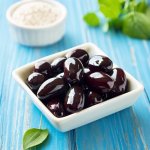paharo45
Active member
I love Kalamata olives but I am trying to branch out to different ones. Which Greek olives do you like best? I did some research about the different types:
Kalamata Olives: Perhaps the most renowned Greek olives, Kalamatas, are recognized by their dark purple color and almond shape. They are often preserved in wine vinegar or olive oil, which further accentuates their rich and fruity flavor.
Halkidiki Olives: These are large, pale green olives from the Halkidiki region of Northern Greece. Known for their crisp flesh and slightly peppery taste, Halkidiki olives are commonly stuffed with various fillings, from feta cheese to almonds, making them a good choice for appetizers.
Amfissa Olives: Cultivated primarily in Central Greece, near the ancient oracle of Delphi, Amfissa olives can range in color from green to black, depending on their ripeness. They have a mild, slightly sweet flavor and a meaty texture.
Throumba Olives: Unique to the island of Thassos, these olives are naturally sun-dried on the tree. They have a wrinkled appearance and a savory taste with a hint of vinegar, due to their natural fermentation.
I have never had any of these olives other than Kalamata and I am sure there are others, too.

Kalamata Olives: Perhaps the most renowned Greek olives, Kalamatas, are recognized by their dark purple color and almond shape. They are often preserved in wine vinegar or olive oil, which further accentuates their rich and fruity flavor.
Halkidiki Olives: These are large, pale green olives from the Halkidiki region of Northern Greece. Known for their crisp flesh and slightly peppery taste, Halkidiki olives are commonly stuffed with various fillings, from feta cheese to almonds, making them a good choice for appetizers.
Amfissa Olives: Cultivated primarily in Central Greece, near the ancient oracle of Delphi, Amfissa olives can range in color from green to black, depending on their ripeness. They have a mild, slightly sweet flavor and a meaty texture.
Throumba Olives: Unique to the island of Thassos, these olives are naturally sun-dried on the tree. They have a wrinkled appearance and a savory taste with a hint of vinegar, due to their natural fermentation.
I have never had any of these olives other than Kalamata and I am sure there are others, too.




